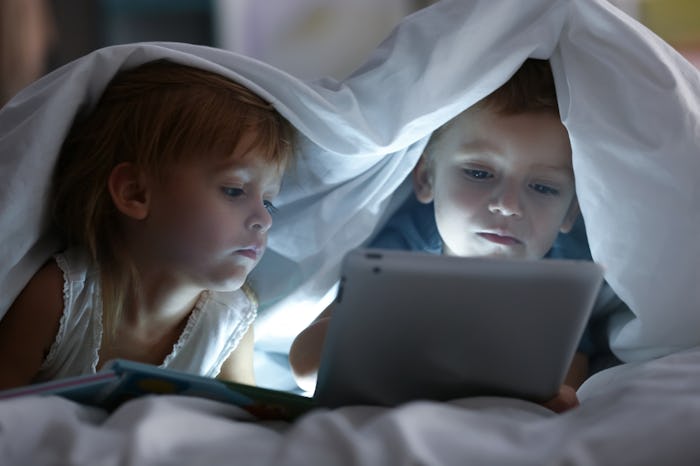Passing a child a cell phone, tablet, or e-reader can be a lifesaver for a busy parent. Screen time works magic on the road, in restaurants, or when you want a little bit of quiet time to get something done. There are benefits to children using technology too, but there are also drawbacks. For one thing, too much screen time before bed is affecting how much sleep kids get, according to new research. Although the findings may be a bit deterring, timing when and how long kids have access to devices can be the secret to making them work for you and your family.
In particular, parents may want to consider keeping electronics away from children in the hours preceding bedtime, as the new research suggests. Researchers from the University of Colorado performed an academic literature review on the impact of screens on children's sleep. A statement released by the university with their findings reported:
Of more than five dozen studies looking at youths ages 5 to 17 from around the world, 90% have found that more screen time is associated with delayed bedtimes, fewer hours of sleep, and poorer sleep quality.
The results of this review, published in the November issue of Pediatrics, found three reasons why screen time negatively impacts how long children sleep, according to Quartz.
As Quartz broke it down, the main takeaways from the study are as follows:
- Much of the content is simply too stimulating to get children ready for bed, particularly mobile and computer games.
- The light coming from devices makes it harder to fall asleep, by "lowering the body's levels of melatonin," a hormone that helps the body know when it is time to go to sleep.
- Screens today are smaller and more compact, making them easier to sneak into bed.
Researchers determined that these factors keep children from getting enough sleep. The National Sleep Foundation's 2014 "Sleep in America Poll" reported over 30 percent of elementary school children and over 50 percent of middle and high school students failed to get their nightly sleep requirement. Unfortunately, not getting enough sleep can have a detrimental impact on one's health, as the 2014 study noted:
Healthy sleep patterns in childhood and adolescence are associated with lower obesity risk, better psychological well-being, improved cognitive functioning, and lower risk-taking behaviors.
Children need a lot of sleep, so making the most of the night hour is important. Preschoolers need 10 to 13 hours, while grade school-aged children should get between nine and 12 hours, and teens should be sleeping between eight and 10 hours a night, according to Harvard Medical School. Additionally, most children need closer to the maximum number of hours to function at their best. Removing the temptation to stare at a screen and ridding children of those pesky blue-lit screens before bed can help you reach these sleep goals.
In order to remedy the damage done by nightly technology usage, researchers suggest that parents remove electronics from children's bedrooms — including TVs and cell phones — and set a firm bedtime routine. It is also important to ensure that children understand the importance of getting a good night's sleep so that they can make healthy sleep choices down the line, the researchers noted.
For parents of younger children at a loss as to how to fill pre-bedtime hours usually spent on screens, I would recommend spending them reading more bedtime stories. Reading together has a number of great benefits for parents and children alike. Along with being proven to actually prepare kids for bed, Parents notes that bedtime stories can also foster parent-child relationships, improve logic skills, lower stress levels, and increase vocabulary.
As tempting as it is to let your little ones play on an iPad or pop in a movie before bed, quality sleep is worth more than the convenience. Spending time on a solid bedtime routine and a little light reading are proven methods that'll do just that.
Watch Romper's new video series, Romper's Doula Diaries:
Check out the entire Romper's Doula Diaries series and other videos on Facebook and the Bustle app across Apple TV, Roku, and Amazon Fire TV.
